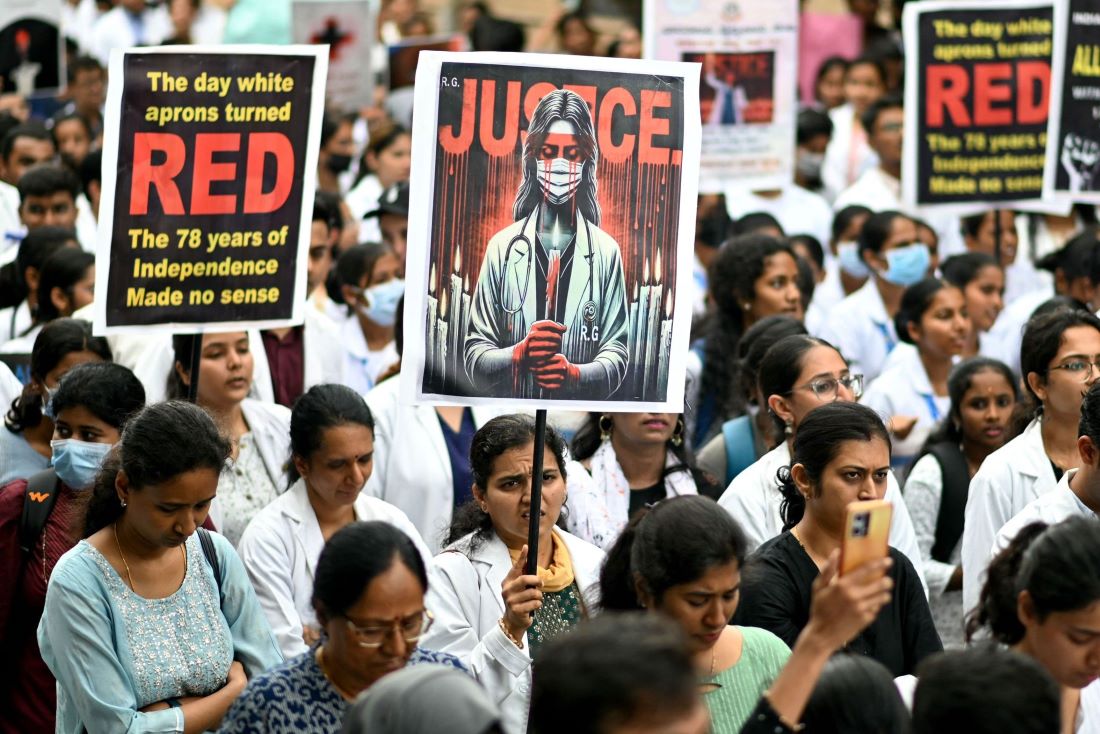
New Delhi: Hospitals and clinics across India turned away patients except for emergency cases on Saturday as medical professionals launched a nationwide strike on Saturday, escalating protests after the “barbaric” rape and murder of their colleague that has channelled outrage at the chronic issue of violence against women.
The strike, which began at 6am, cut off access to elective medical procedures and outpatient consultations, according to a statement by the Indian Medical Association. The discovery of the 31-year-old doctor’s bloodied body on August 9 at a state-run hospital in the eastern city of Kolkata sparked furious protests in several cities across the country.
Many have been led by doctors and other healthcare workers, but also joined by tens of thousands of ordinary Indians demanding action.In Kolkata, thousands held a candlelit vigil into the early hours of Saturday morning.
“Hands that heal shouldn’t bleed,” one handwritten sign held by a protester in the eastern city read.“Enough is enough,” another read, at a rally by doctors in the capital, New Delhi. The murdered doctor was found in the teaching hospital’s seminar hall, suggesting she had gone there for a rest during a 36-hour shift.
An autopsy confirmed sexual assault, and in a petition to the court, the victim’s parents said they suspected their daughter was gang-raped. On Saturday morning, the Indian Medical Association (IMA) escalated protests with a 24-hour “nationwide withdrawal of services”, and the suspension of all non-essential procedures.
“We ask for the understanding and support of the nation in this struggle for justice for its doctors and daughters,” IMA chief R.V. Asokan said, in a statement ahead of the strike.
The IMA called the killing “barbaric”.
“The 36-hour duty shift that the victim was in and the lack of safe spaces to rest … warrant a thorough overhaul of the working and living conditions of the resident doctors,” IMA said in a statement.Doctors are demanding the implementation of the Central Protection Act, a bill to protect healthcare workers from violence.
In Odisha state, patients were queuing up, and senior doctors were trying to manage the rush, said Dr Prabhas Ranjan Tripathy, additional medical superintendent of All India Institute of Medical Sciences in the city of Bhubaneswar.
“Resident doctors are on full strike, and because of that, the pressure is mounting on all faculty members, which means senior doctors,” he said.Patients queued at hospitals, some unaware that they could not get medical attention.
“I have spent five hundred rupees on travel to come here. I have paralysis and a burning sensation in my feet, head, and other parts of my body,” a patient at SCB Medical College Hospital at Cuttack in Odisha told a local television channel.
“We were not aware of the strike. What can we do? We have to return home.”Anger at the failure of tough laws to deter a rising tide of violence against women has fuelled protests by doctors and women’s groups.Sexual violence against women is a widespread problem in India – an average of nearly 90 rapes a day were reported in 2022 in the country of 1.4 billion people.
For many, the gruesome nature of the hospital attack has invoked comparisons with the horrific 2012 gang rape and murder of a young woman on a Delhi bus.That woman became a symbol of the socially conservative country’s failure to tackle sexual violence against women. Her death sparked huge, and at times violent, demonstrations in Delhi and elsewhere.
Comments